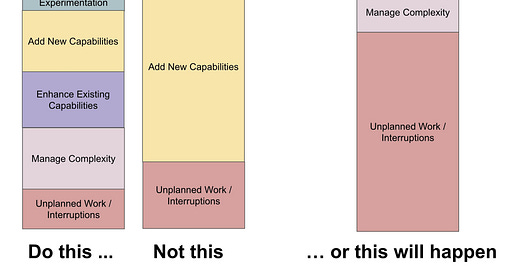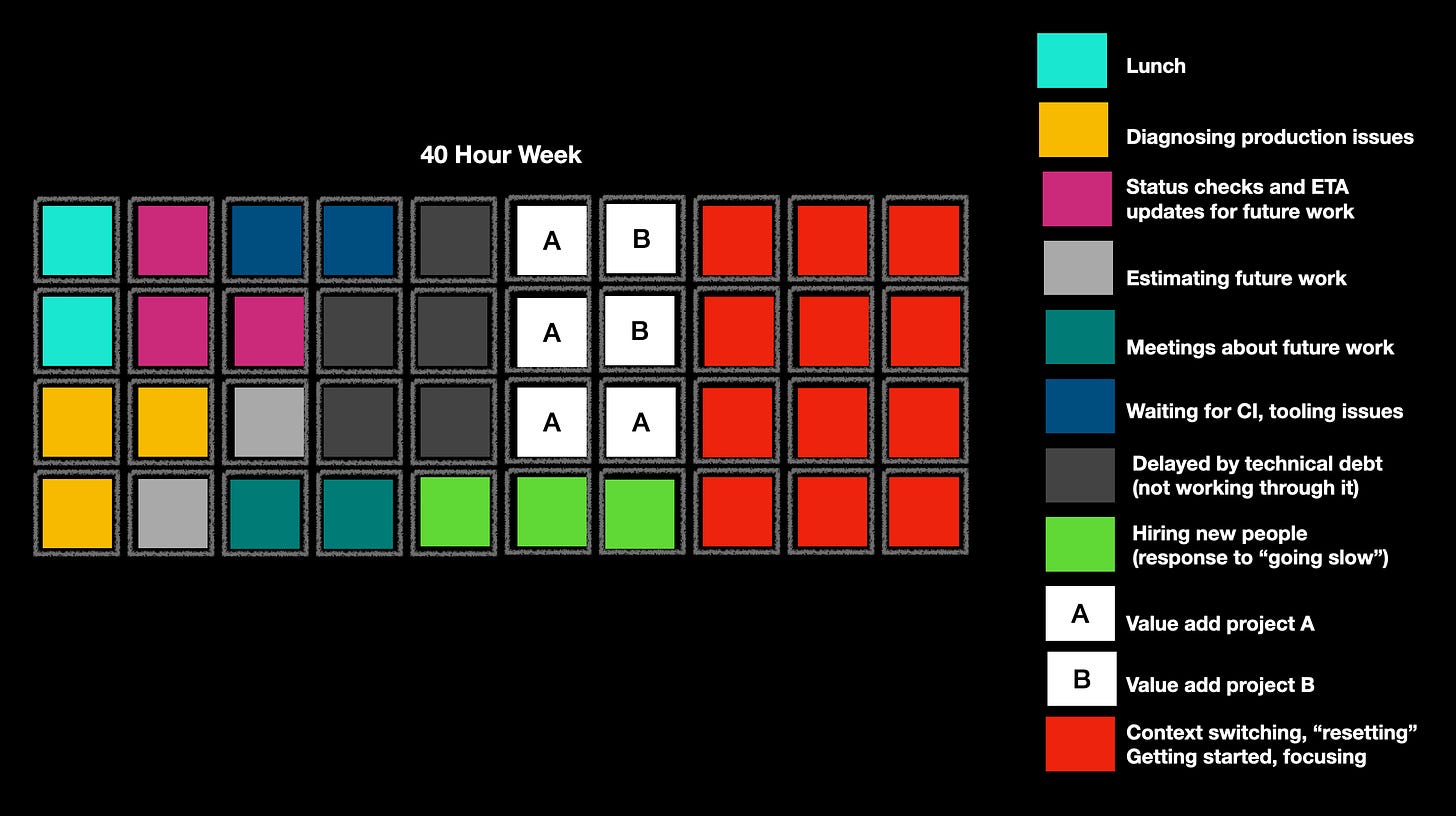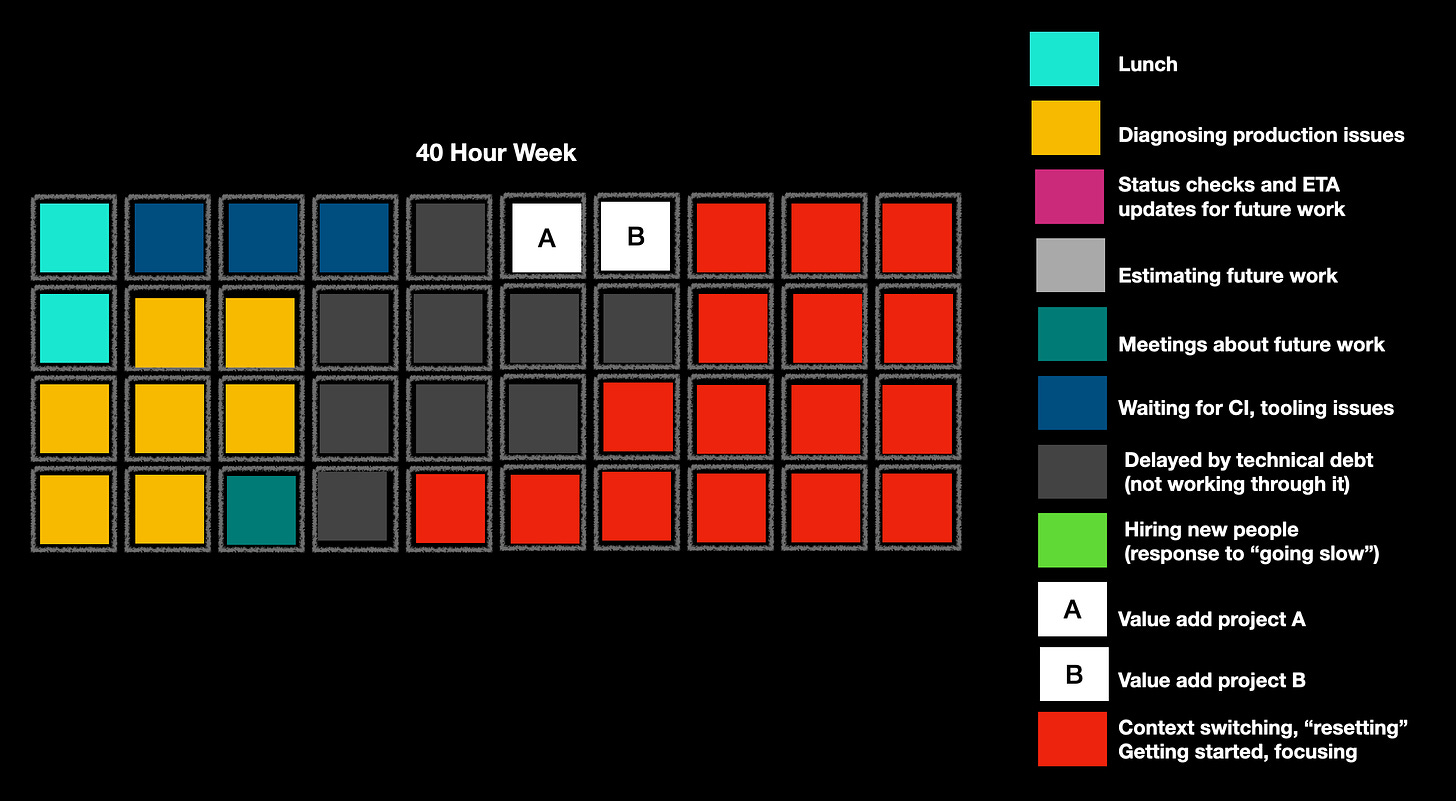Share your calendar(s), and the world will know what you (and your company) values.
Where does your time go?
How much time do you spend:
Talking to customers? Sharing your insights? Reflecting on what you’ve learned recently?
“Managing” stakeholders? In 1:1s without your manager? Planning for things far off into the future? Chats with no clear resolution or progress?
Collaborating with coworkers? Diverging and converging? Moving things forward in a real way?
On things that are valuable, but not the MOST valuable thing you could be working on? Or going down the rabbit hole on something satisfying (e.g. crazy spreadsheet), but not very important?
Meeting with the same 3-5 people across 5 meetings, with a couple other people sprinkled in?
Writing, designing, coding, crafting, making, testing, validating, and thinking? Really thinking? Non-automatic, reactive thinking? Collaborative thinking?
Preparing for presentations where 80% of the people in the room are already familiar with the material? Where there is no valuable feedback?
Decompressing from multitasking? You're not able to get anything done. Not resting. But suffering under a persistent worry that you’re missing something?
Here’s an a 2w team audit:
Sadly, things didn’t improve a couple months later:
Humans are very good at filling up their work days with things that seem important. We’re pragmatic. When we encounter friction in one place, we “flow” to the next task. When we’re stuck, we figure out how to make progress. When there’s a problem, we want to fix it...and we’ll meet with anyone and everyone who can help. If we raise a flag, and nothing happens....we’re smart and make do.
I’ve encountered 10x more over-workers than under-workers in tech. And most of the under-workers were geniuses (coincidence?).
But time spent and pragmatism is not enough. High performing teams spend more time (and energy) on valuable things.
What do/don’t I mean by valuable?
Valuable does not always mean “efficient”. For example, a great kickoff is often messy. You go in circles. You push through to get to a better place, and when you do it’s worth it. Diverse perspectives create better products. Similarly, it might be possible for managers to figure out a plan in a silo, but it would be far better for everyone to see how the sausage is made.
Value is not always certain. If we over-optimize for high certainty time investments, we miss the serendipitous insights that lead to new opportunities. With product, uncertainty is a signal that value is lurking. Example: when was the last time you chatted with a coworker about wild and crazy ways to chip away at a big opportunity? Or were you too busy venting to each other about a toxic leader or an elephant in the room?
Valuable does not only mean “customer facing”. If there’s something causing drag, and that drag impacts the whole team, there’s literally nothing more important to resolve. If better onboarding will make everyone more effective...do that!
Valuable does not mean MORE time. Sometimes the most valuable thing we can do is to spend 60m on an important task, and then decompress for the rest of the day as feedback rolls in.
Just because something is valuable, does not mean it is the MOST valuable thing we could be doing. Say the most valuable thing would be to get a diverse group of people in a room to clarify intent for an upcoming event. But that is hard. So everyone spins up moderately valuable work to pass the time. Or a brilliant developer is off being brilliant, when their skills would be way better applied helping unblock a team?
Valuable does not always mean a myopic focus on one thing. For example, by “gardening” a bit, we prevent the rapid increase of unplanned work/interruptions.
Sometimes the most valuable thing you could be doing is nothing. Or nothing binding at least. Why? Because the work you are spinning up is clouding the bigger issue.
How do they (the higher performing teams) do it? Why are they able to do it?
They foster environments where you can be honest and transparent with other. Can a team member say “you know, this week was a wash!” or “this is not the best use of our time!” More importantly, if someone says that, will there be bandwidth to huddle and figure out a better use of their time?
They don’t chase efficiency and micro-manage people’s time. On the surface it seems like the answer here is to plan out every second of people’s day. “Team, I need you to report on where you spent your time!” An audit might be helpful for a week or two, but the answer is not to micromanage every minute. Rather, the trick is to tend to the systems and relationships that impact how we spend our time (and why).
They don’t over-optimize for what people can do alone. A natural conclusion when you worry about time and value is that people should mostly focus on things they can drive themselves. As we know, while being more efficient, this may not (probably will not) end up being more valuable.
They focus on discovering and unblocking what is blocking people from working on the most important thing. A lot of asymmetries in how people invest their time spring from being blocked somewhere, and trying to make do somehow.
They create systems that support aligned autonomy, and sustain those systems. If every decision needs to be “run up the flagpole” or gets “pushed from above”, you’ll find that a large % of time spent will go into simply recalibrating. Up and down. Hiring lots of human load balancers. Status checks. Syncs. It doesn’t need to be that hard.
They make all work visible. They don’t have “shadow” systems for all the work that happens out of sight. Why does this happen? In many cases it is because they have lost hope that visualizing the work will help them. Say there is an overworked team that keeps asking for help. If visualizing the work will not get them help -- and will just invite micromanagement -- then why visualize the work?
They downplay heroics. If a person gets blocked, and they push through “on their own” -- play the hero -- then that is a sign of the system failing. “It is so hard to X, so I Yed”. These types of heroics are a good sign that somewhere there’s a lot of drag in the system, leading to a lot of non-value-add time.
Long post, but the basic idea is that we need to open our eyes to where our time and energy is going...and also clarify what “valuable” means in our context (with knowledge work it may not look like what we imagine it to look like). Many organizations are burning TONS of fuel and creating a lot of heat and noise, to do very little.







Check our reclaim.ai and getclockwise.com for some newish SaaS companies looking to solve these problems through tooling in the intersection between deep work and shared work in our new remote world!
Hey John - you account a lot of time for context switching in your example. Do you really believe context switching is burning that much of our time? Also would you have in mind switching between products/projects (if applicable) or simply type of tasks people do? Would be great to get your thoughts on that. Regardless - thanks for the text!